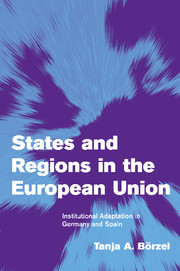Book contents
- Frontmatter
- Contents
- List of figures
- List of tables
- Acknowledgements
- List of abbreviations
- Introduction
- Part I Europeanization and domestic institutional change: A historical institutionalist approach
- Part II Reinforcing cooperative federalism: Institutional adaptation to Europeanization in Germany
- Part III Transforming competitive regionalism: Institutional adaptation to Europeanization in Spain
- 7 The Spanish State of Autonomies as a form of competitive regionalism
- 8 Toward a framework of joint decision-making: The impact of Europeanization on the territorial institutions of Spain
- 9 Conclusion
- Part IV Sharing versus shifting the costs of adaptation: The Europeanization of environmental policy-making in Germany and Spain
- Conclusions: Toward convergence in Europe?
- Appendix: The major EU environmental policies of the policy study
- List of references
- Index
8 - Toward a framework of joint decision-making: The impact of Europeanization on the territorial institutions of Spain
Published online by Cambridge University Press: 22 September 2009
- Frontmatter
- Contents
- List of figures
- List of tables
- Acknowledgements
- List of abbreviations
- Introduction
- Part I Europeanization and domestic institutional change: A historical institutionalist approach
- Part II Reinforcing cooperative federalism: Institutional adaptation to Europeanization in Germany
- Part III Transforming competitive regionalism: Institutional adaptation to Europeanization in Spain
- 7 The Spanish State of Autonomies as a form of competitive regionalism
- 8 Toward a framework of joint decision-making: The impact of Europeanization on the territorial institutions of Spain
- 9 Conclusion
- Part IV Sharing versus shifting the costs of adaptation: The Europeanization of environmental policy-making in Germany and Spain
- Conclusions: Toward convergence in Europe?
- Appendix: The major EU environmental policies of the policy study
- List of references
- Index
Summary
This chapter shows how the Spanish territorial institutions faced similar pressure for adaptation as the German ones but induced the Spanish regions to pursue a non-cooperative adaptational strategy, which prohibited a redressing of the territorial balance of power. In light of rising adaptational costs the CCAA gradually adopted a more cooperative strategy, which resulted in a profound change of Spanish competitive regionalism.
The centralization of implementation and the uneven distribution of “say and pay”
Europeanization posed a serious challenge to the still fragile territorial institutions of Spain. Similar to the former Art. 24 of the German Grundgesetz (GG), Art. 93 of the Spanish Constitution allows for the transfer of both national and regional competencies to the European level without requiring the consent of the CCAA. Unlike the Länder, the CCAA do not have any co-determination powers to lose when national competencies are transferred to the European level because they do not participate in national decision-making. Nor have the CCAA been so concerned about the Europeanization of their autonomous competencies per se, although they are considerably affected in the area of agriculture, fisheries, industry, economic planning, environment, social welfare, and consumer affairs (Borras 1990). The CCAA have, however, felt that the central state would use the implementation of Community Law as an “alibi” to regain competencies previously devolved to the CCAA (Pujol 1987: 25).
When Spain joined the European Community in 1986, the Spanish administration faced a huge implementation burden.
- Type
- Chapter
- Information
- States and Regions in the European UnionInstitutional Adaptation in Germany and Spain, pp. 103 - 147Publisher: Cambridge University PressPrint publication year: 2001



